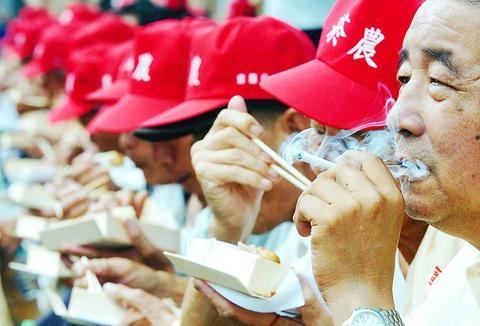Over 1,000 of the nation's tobacco growers yesterday petitioned for a raise in this year's government purchase volume of domestic tobacco, to compensate for investments they have already made.
"The nation's tobacco growers have poured money into necessary investment, such as soil preparation, for the more than 2,100 hectares of [tobacco] farmland across the country," Chen Man-hsiang (陳滿祥), representative of a local tobacco growers' association, told the Taipei Times in a telphone interview.

PHOTO: SEAN CHAO, TAIPEI TIMES
The growers hope the Executive Yuan will increase the buying volume of locally-grown tobacco leaves for this year from the previously agreed half of the output to 70 percent to make up for their investment, Chen said.
Tobacco farmers also hope the government will shorten its proposed three-year purchasing scheme to two years, as revenues from reduced production in the third year would not be even enough to cover the reaping costs, Chen said.
Switch crops
The Cabinet decided last month to continue buying locally-grown tobacco leaves and lowering the purchase volume over the next three years. The Cabinet also instructed the Council of Agriculture to help the tobacco growers switch from tobacco to other crops.
According to the government's plan, this year it will purchase about 274.5 million kilograms, or roughly half the volume it bought last year. Next year, the government will buy 20 percent less in volume than this year's amount, with the same reduction in 2006.
Extra expenses
The state-run Taiwan Tobacco and Liquor Corp (TTL,
"[The policy makes] us incur an extra NT$400 million of inefficient expenses, at the same time as we're working to improve our spending efficiency, which has provoked resistance from employees," said TTL Chairman Morgan Hwang (
TTL's extra expenses won't deter it from its privatization process. By the end of next year the company expects that less than 50 percent of its shares will be government-owned. The extra expenses for purchasing could continue indefinitely, though, as the government will likely remain a large shareholder, Hwang said.
Hwang admitted that this could have a negative impact on the company's plan to get strategic investment from foreign-owned tobacco companies, and could decrease the company's share price.
The former tobacco and liquor monopoly has up to 20 million kilograms of tobacco inventory in the warehouse, which may not be consumed in the next five years, adding to the company's extra storage and manpower expenses, Hwang said.
TTL reported a pretax profit of NT$6.8 billion between January and last month and expects to create NT$10 billion this year, up 20 percent from last year, according to the company.

Sweeping policy changes under US Secretary of Health and Human Services Robert F. Kennedy Jr are having a chilling effect on vaccine makers as anti-vaccine rhetoric has turned into concrete changes in inoculation schedules and recommendations, investors and executives said. The administration of US President Donald Trump has in the past year upended vaccine recommendations, with the country last month ending its longstanding guidance that all children receive inoculations against flu, hepatitis A and other diseases. The unprecedented changes have led to diminished vaccine usage, hurt the investment case for some biotechs, and created a drag that would likely dent revenues and

Macronix International Co (旺宏), the world’s biggest NOR flash memory supplier, yesterday said it would spend NT$22 billion (US$699.1 million) on capacity expansion this year to increase its production of mid-to-low-density memory chips as the world’s major memorychip suppliers are phasing out the market. The company said its planned capital expenditures are about 11 times higher than the NT$1.8 billion it spent on new facilities and equipment last year. A majority of this year’s outlay would be allocated to step up capacity of multi-level cell (MLC) NAND flash memory chips, which are used in embedded multimedia cards (eMMC), a managed

CULPRITS: Factors that affected the slip included falling global crude oil prices, wait-and-see consumer attitudes due to US tariffs and a different Lunar New Year holiday schedule Taiwan’s retail sales ended a nine-year growth streak last year, slipping 0.2 percent from a year earlier as uncertainty over US tariff policies affected demand for durable goods, data released on Friday by the Ministry of Economic Affairs showed. Last year’s retail sales totaled NT$4.84 trillion (US$153.27 billion), down about NT$9.5 billion, or 0.2 percent, from 2024. Despite the decline, the figure was still the second-highest annual sales total on record. Ministry statistics department deputy head Chen Yu-fang (陳玉芳) said sales of cars, motorcycles and related products, which accounted for 17.4 percent of total retail rales last year, fell NT$68.1 billion, or

In the wake of strong global demand for AI applications, Taiwan’s export-oriented economy accelerated with the composite index of economic indicators flashing the first “red” light in December for one year, indicating the economy is in booming mode, the National Development Council (NDC) said yesterday. Moreover, the index of leading indicators, which gauges the potential state of the economy over the next six months, also moved higher in December amid growing optimism over the outlook, the NDC said. In December, the index of economic indicators rose one point from a month earlier to 38, at the lower end of the “red” light.